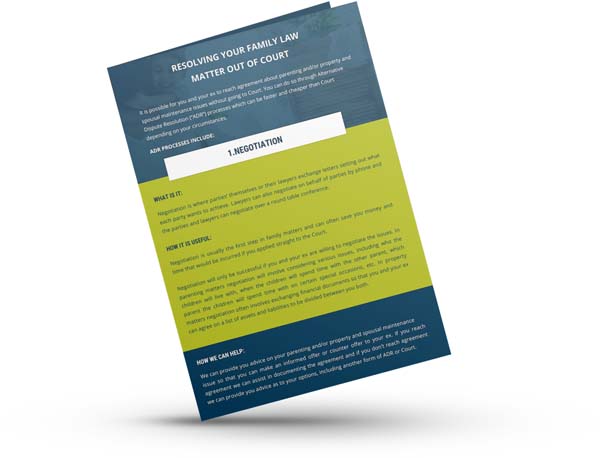Are you finding it impossible to reach an agreement with your ex about arrangements for the children and/or how to divide your assets? Are you in Court and there is an Order for you to attend Mediation and you don’t know what it is and what you need to do? Read on to find out more.
WHAT IS MEDIATION?
Mediation is a structured negotiation process where an independent person (the mediator assists parties to:
- Identify issues in dispute; and
- Negotiate a resolution to the issues in dispute.
A Mediator does not decide the outcome of the Mediation but rather oversees the process and guides the negotiations between the parties to help them reach a solution. Mediators remain neutral during the process and cannot give legal advice.
WHAT HAPPENS DURING MEDIATION?
Mediations are generally run as a “shuttle Mediation”. You and your ex (and your lawyers if you have them) remain in separate rooms and don’t see each other. The Mediator goes between you both to pass on offers and counter offers that you and your ex make as well your concerns.
Mediations are normally run in the following way:
- The Mediator will meet with you and your ex separately (with your lawyers if you have them) to explain what will happen during the day. If you and your ex agree you may join each other, the lawyers and the Mediator for an initial joint session to discuss the issues in dispute.
- While you, your lawyer and the Mediator are in the room you will tell the Mediator what concerns you have (if any) and what outcome you want to achieve for parenting and/or property and spousal maintenance. Your lawyer (if you have one) will give you advice on whether your desired outcome is achievable and what offer you should make to your ex. The Mediator will go to your ex with your offer. Depending on the agenda of the day you may or may not be the first person to make an offer.
- Your ex will consider your offer and either accept it or advise the Mediator of what counter-offer they want to make. The Mediator will come to you with your ex’s counter offer.
Negotiations will continue until you or your ex negotiate an agreement or until the end of the allocated time for the Mediation. In our experience most Mediations will run the entire day.
If you and your ex reach agreement then depending on how much time there is the agreement may be documented in a Heads of Agreement or drafted into a legally enforceable order.
WHEN SHOULD YOU PARTICIPATE IN MEDIATION?
You may decide to or may be required to participate in Mediation if:
- You are trying to negotiate with your ex out of Court
You and your ex can voluntarily participate in Mediation.
Mediation is only one way that you and your ex can try to reach agreement out of Court.
To find out other ways you can try to reach agreement before applying to the Court check out our factsheet called “Resolving your Family Law matter out of Court”.
- You want to apply to the Court for parenting Orders
In parenting matters you need to take steps to participate in FDR and make a genuine effort to resolve the issues in dispute. There are certain circumstances where you do not need to attend FDR, for example if there are issues of abuse, risk or urgency.
- You are already in Court for your property matter
If you are in Court and the Judge has made an Order that you and your ex attend Mediation to resolve property matters you will need to participate in Mediation. The Order may also set out who is to pay for the Mediator’s fees and the room hire fee if you attend a private Mediation.
IS MEDIATION CONFIDENTIAL?
Mediation is confidential which means neither you nor you ex can refer to what occurred during Mediation later in Court (if your matter is in Court or later proceeds to Court).
WE CAN HELP:
The Family Law team at McInnes Wilson Lawyers is here to assist you throughout the Mediation process. We can provide you advice on whether Mediation is the right option for you and also help you prepare and attend with you at Mediation. Contact us today for an obligation-free appointment.
Special Counsel

